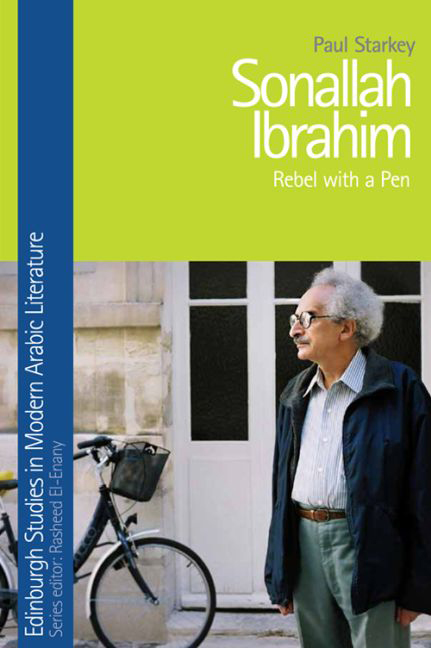Book contents
- Frontmatter
- Contents
- Series Editor's Foreword
- Preface
- 1 Introduction: Background and Context
- 2 Rebel with a Pen
- 3 Cairo Prison: Tilka al-raʾiha (1966)
- 4 Michelangelo and the Dam: Najmat Aghustus (1974)
- 5 CocaColaland: al-Lajna (1981)
- 6 War in Lebanon: Bayrut, Bayrut (1984)
- 7 Consumer Society: Dhat (1992)
- 8 Prison of Dishonour: Sharaf (1997)
- 9 Widening Horizons (1): Sex, Memory and Revolution: Warda (2000)
- 10 Widening Horizons (2): In the Land of the Capitalists: Amrikanli (Amri Kan Li) (2003)
- 11 Return to Childhood: al-Talassus (2007)
- 12 The French Connection: al-ʿImama wa-al-Qubbaʿa (2008) and al-Qanun al-Faransi (2008)
- 13 Filling a Gap: al-Jalid (2011)
- 14 Epilogue
- Bibliography
- Index
2 - Rebel with a Pen
Published online by Cambridge University Press: 23 September 2017
- Frontmatter
- Contents
- Series Editor's Foreword
- Preface
- 1 Introduction: Background and Context
- 2 Rebel with a Pen
- 3 Cairo Prison: Tilka al-raʾiha (1966)
- 4 Michelangelo and the Dam: Najmat Aghustus (1974)
- 5 CocaColaland: al-Lajna (1981)
- 6 War in Lebanon: Bayrut, Bayrut (1984)
- 7 Consumer Society: Dhat (1992)
- 8 Prison of Dishonour: Sharaf (1997)
- 9 Widening Horizons (1): Sex, Memory and Revolution: Warda (2000)
- 10 Widening Horizons (2): In the Land of the Capitalists: Amrikanli (Amri Kan Li) (2003)
- 11 Return to Childhood: al-Talassus (2007)
- 12 The French Connection: al-ʿImama wa-al-Qubbaʿa (2008) and al-Qanun al-Faransi (2008)
- 13 Filling a Gap: al-Jalid (2011)
- 14 Epilogue
- Bibliography
- Index
Summary
Sonallah Ibrahim was born in Cairo in 1937, into what appears to have been a somewhat dysfunctional family. His father, a high-ranking Egyptian civil servant, was nearly sixty when Sonallah was born – the first child of his father's considerably younger second wife, who had originally been hired as a nurse to tend to his paralysed first wife. ‘I am the son of a father from the upper-middle class’, Sonallah Ibrahim recalled a few years ago. ‘But his family looked down on me because my mother was from a poor background. She was more like a maid to my father's first wife.’
For reasons that are not entirely clear, the second wife apparently disappeared from the family scene at an early stage, a development that did little to alleviate the somewhat lonely existence that Sonallah Ibrahim appears to have suffered for most of his childhood. Details of his childhood are fairly sparse, but it is clear that his relationship with his father (who in terms of his age was more like a grandfather to him) was an important one in his formation. Sonallah Ibrahim's father had held civilian posts in the War Ministry in Egypt and the Sudan, and the writer records that, like many men of his generation, he embodied a number of contradictions: he describes him as being both ‘religious’ and ‘enlightened’, and records that from him he learned both ‘to respect many religious values’, and at the same time ‘to hate the British occupier, the King, and corrupt parties; to be ready to rebel against the prevailing conditions and ideas; and not to accept anything that was not in accord with reason’. Bored at school, where he was a mediocre student, he quickly sought refuge in the world of fantasy – conveyed to him, as to other writers of his generation, through the Riwayat al-jayb (Pocket Stories) series of publications, where he made the acquaintance of such ‘heroes’ as Arsène Lupin, Robin Hood, the Three Musketeers, and Captain Blood – many of them renowned, as the author notes, for ‘taking from the rich and giving to the poor’. He made his own first writing experiments at the age of twelve or thirteen, and also tried translating stories from English into Arabic at about the same time.
- Type
- Chapter
- Information
- Sonallah IbrahimRebel with a Pen, pp. 17 - 33Publisher: Edinburgh University PressPrint publication year: 2016



